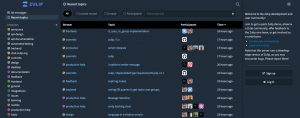
Introducing the public access option oferring one-click access with no login required.
— Yoann Rodière, senior engineer at Hibernate
SAN FRANCISCO, CA, UNITED STATES, May 5, 2022 /EINPresswire.com/ — Zulip, the modern team collaboration tool with unique topic-based threading ideal for live and asynchronous conversations, today announced the release of Zulip’s public access option. Open-source projects and other open communities can now offer one-click access (no login required!) to part or all of their Zulip chat.
Building an open-source community is made easier if you have communication tools that support transparency in decision making, asynchronous collaboration, and using contributors’ time efficiently. Because Zulip is uniquely designed to enable distributed (and part-time) work, it has long been an excellent fit for open source development. The public access option Zulip introduces today takes it to the next level.
Introducing the public access option
With today’s launch of a public access option, Zulip has become a communication tool that is truly in accordance with the open source community’s values of openness, transparency and inclusion.
One-click viewing access to conversations in the Zulip app
Zulip has always offered both private (invitation-only) streams, and public streams, which any member of the organization can join. The public access feature we launch today additionally lets organizations configure any of their public streams to be web-public, i.e. visible to anyone on the Internet without creating an account. Visitors can view web-public streams, and sign up or log in if they’d like to participate. As before, other streams can be public just for logged in users, or private (with or without shared history).
Visitors can use the same ways of finding and consuming information in Zulip as logged in users, including:
Reading conversations one at a time, or skimming recent discussions via All messages.
Following the exact same permanent links as logged in users to see to a message in context, a discussion thread, or an entire stream.
Browsing recent conversations in all the web-public streams to find topics of interest.
Finding information in prior discussions with Zulip’s powerful full-text search.
“Zulip’s public access feature makes past user questions and feedback accessible to the whole web, which is perfect for linking to them from other platforms such as JIRA. It’s much more convenient than having those threads locked behind a login page.”
— Yoann Rodière, senior engineer at Hibernate (public access beta community)
Open access to question answers
Zulip offers a convenient platform for open-source communities to respond to questions from users and contributors. “Asking questions in a real-time #helpdesk chat on Zulip has many benefits. It’s quick and easy — there’s less pressure than posting a question on Discourse or GitHub,” explains long-time Julia community member Sascha Mann. “It also comes with low overhead for the people responding, as many of them already have Zulip open anyway.”
The public access option helps unlock the accumulated archive of questions and answers. “In the past, all the amazing knowledge in these channels would only be available to people who already knew about the community on Zulip, and were motivated enough to create an account. The public access feature opens up the information,” Sascha says. “It also lowers the barrier for jumping from being a reader to being an active participant, which will hopefully help our community grow.”
“The public access feature combines many of the advantages of real-time and more formal settings for answering questions.”
— Julia community member Sascha Mann
Research communities, standards organizations, and others
Beyond open source, other organizations operating in the open also benefit from Zulip’s public access option.
Researchers can now permanently link to a Zulip conversation or a message in context from emails, notes, talk slides, or anywhere else, with no sign-up required to view the content. For example, the Lean theorem prover community [case study] has opened up half a dozen popular streams to the world.
The community that develops the HL7 FHIR standard for health data interoperability sends over ten thousand Zulip messages every month. ”The public access option expands access to knowledge that has accumulated in the FHIR community over 6+ years of Zulip usage,” explains Dr. Josh Mandel, Chief Architect for Microsoft Healthcare and a leader in the FHIR community.
“Public access lowers the friction for linking to Zulip discussions from external resources such as HL7’s issue tracker or Stack Overflow answers, and promotes knowledge sharing across the health standards community.”
— Josh Mandel, MD, Chief Architect for Microsoft Healthcare
Sponsorships. We proudly sponsor free Zulip Cloud Standard hosting for 700 open-source projects, non-profits, education, and academic research groups. All eligible organizations are encouraged to join the program!
For more information on how to get involved with the Zulip open-source community, please see https://zulip.com/development-community/.
To learn more about Zulip, you can check out our customer stories. Connect with Zulip on Twitter at @zulip and LinkedIn.
About Zulip
Zulip, developed by Kandra Labs, Inc., is uncompromisingly free and open-source software, used by thousands of organizations as a better alternative to Slack, Discord or Microsoft Teams. Zulip is built by a distributed team, with its leadership based in San Francisco, California and over 1100 open-source contributors from around the world. Zulip’s threaded conversations help thousands of companies of all sizes, open-source projects and non-profits stay organized, seamlessly melding asynchronous and real-time communication. Current Zulip users include teams from Akamai Technologies, the Rust programming language community, Pilot, Wikimedia Foundation, LevelUp, MariaDB Foundation, HL7 International, and more.
Zulip has its roots at MIT, where the original founding team was inspired by the BarnOwl chat client for the Zephyr protocol, and the incredible community that Zephyr supported at MIT. The first Zulip Inc. startup was acquired by Dropbox in early 2014 while the product was still in private beta. In late 2015, Dropbox generously released Zulip as open-source software. In 2016, Tim Abbott, one of the original founders of Zulip, founded Kandra Labs to sustain and grow Zulip’s ongoing development. Kandra Labs is a values-focused company supported by $1M in SBIR grants from the US National Science Foundation.
Jessica Rees
Publicity.IM
+1 415-889-7444
email us here
Visit us on social media:
Twitter
LinkedIn
![]()
The post Introducing the Zulip Public Access Option for Open Communities first appeared on Reality Syndicate Viewers.

 ,
,





